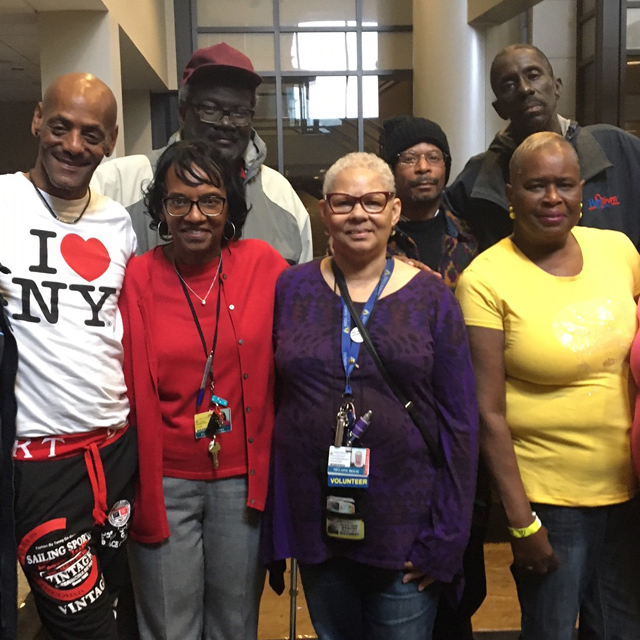When Kellee Browning was diagnosed with human immunodeficiency virus (HIV) in 1996, she thought it was a death sentence.
“I was scared to death in the beginning,” says Browning, of Cumberland, Maryland. “I thought I’d be dead in six months. We were still learning so much then.”
Browning, now 60, has participated since 2005 in the Johns Hopkins HIV County Program, which was established in 1994. Funding from the federal Ryan White HIV/AIDS Program enables Johns Hopkins providers to travel to suburban health departments in communities that has little HIV care. The Johns Hopkins HIV County Program provides on-site HIV subspecialty care in collaboration with local health department case management in Allegany, Anne Arundel, Baltimore, Carroll, and Frederick, Harford, Howard and Washington counties.
Browning says that, because of counseling, doctor appointments and medication management provided by the program, her viral load has stayed low and she has hope.
“Time is always the best truth teller,” she says. “The program gave me confidence because of its experience and expertise. I didn’t get sick. I knew that I had the best brains around helping me do this.”
Browning says she has received a “wonderful education” from the program, and she decided to help others diagnosed with HIV. She has served on the program’s patient advisory committee, which gives feedback about the quality of care, and she became an HIV health advocate.
“I’ve been out in front from the beginning,” she says. “I like to help other people. I’ve been on TV and in newspapers talking about HIV. I talk to kids that have had trouble with the law, and I’ve worked with health departments, colleges and high schools.”
Physician assistant John Gerwig is Browning’s care provider. He has worked with Johns Hopkins Medicine for 25 years.
Gerwig says patients like Browning thrive because they follow guidelines for HIV infection treatment by completing laboratory studies when needed and taking antiviral therapy.
“Our program has high retention in care rates,” Gerwig says. “We’ve had enthusiastic participation with health departments, and the program has been very successful.”
Gerwig notes that the HIV culture is different in more suburban areas.
“Folks want anonymity,” he says. “They have fascinating histories, but they can be guarded. It takes a while to establish good relationships. It’s a lot more than medicine. You become more than a medical provider. You become a counselor as well.”
David Griffith, M.D., the program’s medical director, says the program works because of a strong collaboration with the county health departments.
“We work with case managers to address any access issues,” Griffith says. “We will see anyone with an HIV diagnosis. Insurance status is not a barrier. The Ryan White fund ensures everyone living with HIV can get medication and medical care.”
There are 800 patients in the county program, according to Griffith. During the COVID-19 pandemic, the team has had to rally together to make sure the patients’ needs are met.
“We were able to rise to the challenge with telemedicine and additional patient outreach,” Griffith says. “Overall, our patients do very well. We’re very proud that we can help keep our patients on their medications and healthy. Staying on HIV medications not only helps the individual, but can decrease community transmission of HIV. Patients on medication can achieve undetectable HIV levels, which makes transmission unlikely.”
Nurse practitioner Iryne Zziwa-Kabenge, M.S.N., says the program serves a substantial immigrant population. Zziwa-Kabenge is from Uganda and says her background has helped her appreciate the patients’ perspectives.
“There’s still a stigma associated with infection and there’s a fear of disclosing,” she says. “Many of my immigrant patients take time to understand that it’s a chronic illness and that they need to stay on medication and work with their providers. We work to help them dispel the misinformation and improve their health and well-being.”
Zziwa-Kabenge lauds the program’s family-like environment.
“We all work closely together,” she says. “Should the patients need any kind of specialty care, we can find it for them.”
Senior clinical nurse Sheri Mancini has been working in HIV treatment programs since 1988. While treatment has undoubtedly improved, the patient’s first step through the door is always hard, she says.
“I can’t tell you how many times patients have been terrified,” Mancini says. “I reach out and let them know they’ll be OK. I let them know that this is a leap of faith, but you’ve got a great team here. Our program works so hard to connect people to resources. Whatever they need, we can tailor the interventions to meet the patients’ needs. The care is very individualized. It’s not one size fits all.”
Decades ago, the side effects of HIV medications were often unbearable, she says. Patients were taking at least eight pills three times per day, and they had nausea, vomiting and diarrhea.
“Now, it’s one pill once a day,” Mancini says. “It’s been miraculous. We got there because of the people that volunteered for the research projects. They were so brave. Because of them, HIV-positive women can have HIV-negative children. Now, HIV viral loads will stay undetected if patients keep taking the medicine.”



